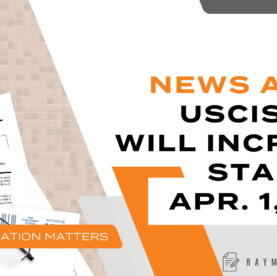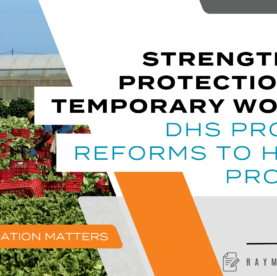The Weekly Round-Up: Spending Bill Leaves Unanswered Questions on Immigration, Premium Processing Suspended for H-1B Visas, and ICE Director to Testify on Sanctuary City Issue
Proposed Budget Leaves Much Unanswered on Immigration
Congress released a proposed omnibus budget on Wednesday that addresses certain immigration issues but leaves many of the most important issues unaddressed.
What the Bill Does: In a compromise, the bill adds funding for an additional 328 Customs and Border Patrol Officers for border security, but at the same time, requires Immigration and Customs Enforcement (ICE) to reduce the number of immigrants in detention facilities. This will likely force ICE to reset arrest priorities. The bill also appropriates a separate $1.6 billion for border security, money that had already been allocated for a fence on parts of the U.S. border with Mexico.
What the Bill Does Not Do: The bill does nothing with respect to Deferred Action for Childhood Arrivals (DACA), the Obama-era program that provided protection from deportation for noncitizens who entered the country as children prior to June 2007. The bill also does nothing to fund President Trump’s “border wall,” but merely continues to fund the fence along the border. President Trump offered to provide temporary relief for those eligible for DACA in exchange for $25 billion for increased border security. Democrats rejected the short-term solution, saying they would support the $25 billion in border security if Trump backed a pathway to citizenship for immigrants who are DACA-eligible. The White House rejected this counteroffer, and both efforts stalled. The bill does not address defunding sanctuary cities, something the Department of Justice has stated on multiple occasions that it will address.
The bill has not been passed by Congress, and if it is not passed by midnight Friday, March 23, parts of the government will shut down. We will continue to provide updates on the budget and how it will affect immigration laws.
USCIS Suspends Premium Processing for Skilled Workers
The U.S. Citizenship and Immigration Services suspended speedy processing of visas for skilled professionals, meaning that companies will have extensive wait times to learn whether foreign job applicants will be able to work in the U.S. later this year.
The filing window for H-1B visas – designed for foreign skilled workers – is set to open in the first week of April. For many years, the government permitted companies to pay a separate fee to have the application adjudicated in 15 days, providing a prompt decision as to whether the prospective employee would be able to work in the U.S. With this process now officially suspended, companies must wait several months for a ruling, causing deep uncertainty for companies’ staffing needs, and even affecting whether companies will move forward with particular projects.
Company representatives or employees who think they may be affected by this policy change are encouraged to contact an experienced immigration attorney immediately.
ICE Director Likely to Testify in California Sanctuary City Suit
In the lawsuit filed by the Trump Administration against the State of California to block its “sanctuary city” policies, a federal judge has indicated he will likely require the head of Immigration and Customs Enforcement (ICE) to testify in court.
U.S. Magistrate Kendall Newman has said he is inclined to require approximately four hours of testimony from ICE Director Thomas Homan explaining how the federal government is suffering irreparable harm from California’s refusal to fully cooperate with ICE’s request to detain certain noncitizens and turn over information related to particular immigrants. This is unsurprising, as the federal government’s case relies substantially upon a 45-page affidavit from Homan regarding the detriment California’s policies pose for ICE’s enforcement operations. Questioning will be limited solely to California’s sanctuary city policies, despite state officials’ requests to ask about issues at immigration detention facilities and other immigration enforcement practices.
We will continue to update our readers as this case proceeds.




